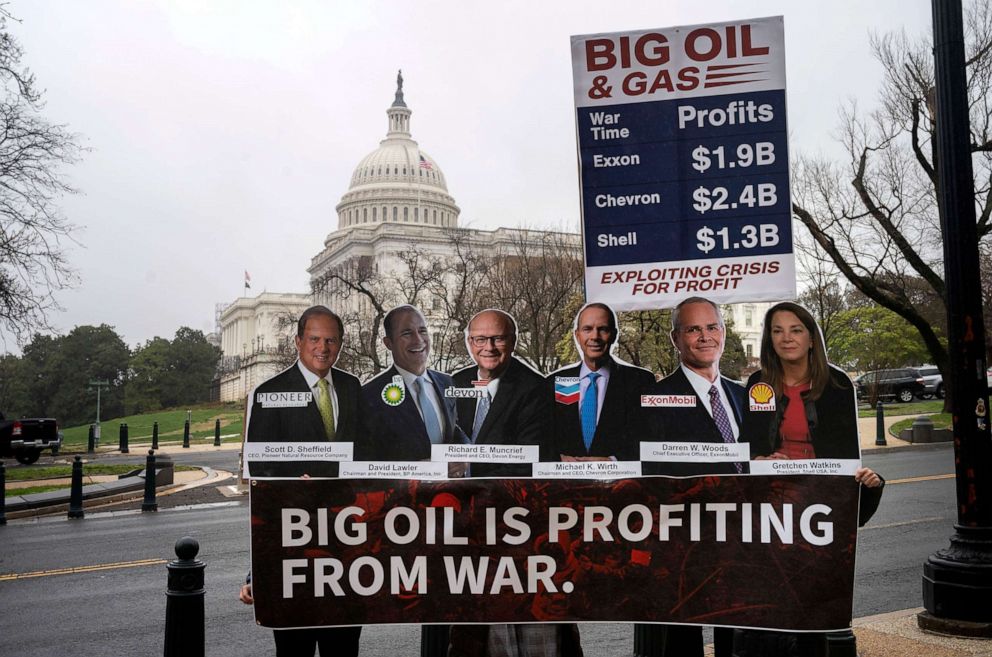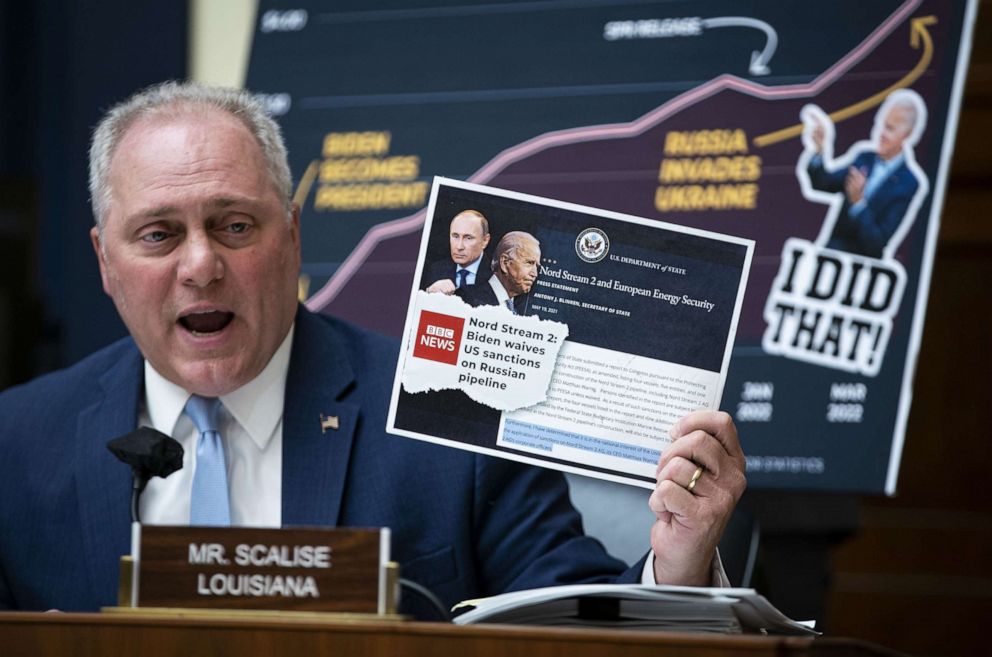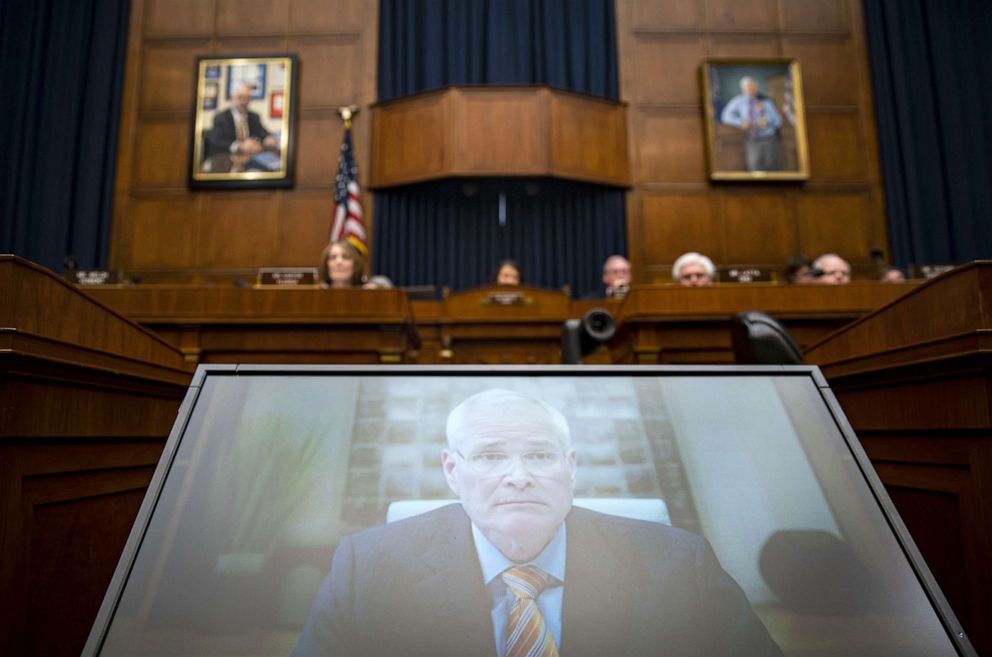'Big Oil' CEOs testify before Congress amid skyrocketing gas prices
The hearing reflected the political messaging battle over pain at the pump.
Six oil company executives were grilled by lawmakers Wednesday about skyrocketing gas prices amid a political messaging battle over pain at the pump.
BP America, Chevron and ExxonMobil executives are among the leaders who faced questions from members of the House Energy and Commerce Subcommittee on Oversight and Investigations.
The hearing came after costs for gas rose following Russia's invasion of Ukraine, which prompted the U.S. to put a ban on imports of Russian oil and gas. Though the price of gas has dropped slightly in recent days, Americans were still paying an average $4.16 as of Wednesday, according to American Automobile Association data.
"While American families are forced to pay record-high prices at the pump, frankly this committee is not going to sit back and allow this system -- which forces American taxpayers to pay oil companies out of both pockets, first at the pump and then through tax breaks -- to continue in its current form," said Rep. Diana DeGette, D-Colo., chair of the subcommittee, in her opening remarks.
Oil executives took turns defending themselves and their companies, pushing back on accusations of price gouging.
"I want to be absolutely clear: We do not control the market price of crude oil or natural gas, nor of refined products like gasoline and diesel fuel, and we have no tolerance for price gouging," Chevron CEO Michael Wirth said.
The executives cited the COVID-19 pandemic as a reason for cost increases and promoted increasing production to offset the spike.
"While there is no quick fix, the answer in the near term, until there are more widely available and affordable alternatives, is straightforward. We need to increase the supply of oil and natural gas," ExxonMobil CEO Darren Woods said.
With politicians on both sides of the aisle continuing to spar over who's to blame for gas prices, Democratic lawmakers on the subcommittee weren't buying the oil companies' explanations.
"One bad year does not excuse the practice of ripping off American consumers," Rep. Ann Kuster, D-N.H., said.
"It's a matter of patriotism," Rep. Frank Pallone, D-N.J., added. "Something must be done on your part."

Democrats have worked hard to pinpoint Russia's invasion of Ukraine as the source of the rise in gas prices, with President Joe Biden coining it "Putin's price hike."
Republicans, on the other hand, are quick to argue that the higher costs kicked in long before the war began and that Biden's energy policies are what's hurting Americans' pocketbooks.
Sen. Dan Sullivan, R-Alaska, accused House Democrats of hosting a "show trial" with the hearing.
"It's kind of an annual right of passage bringing forward energy oil and gas executives," he said. "You know what a show trial is, the subject of the trial being flogged for something that is usually the fault of the very officials conducting the trial."
Senators described the increase of energy prices as "purposeful" -- arguing that the Biden administration intentionally raised gas prices to advance green energy policies.
"When it costs you 100 bucks to fill the tank of your truck that is Joe Biden's fault," Sen. Ted Cruz, R-Texas, said. "When it costs 100 bucks to fill the families minivan that is Joe Biden's fault."
Patrick De Haan, head of Petroleum Analysis at GasBuddy, told ABC News the reasons behind the cost of gas are more complicated than any one of the partisan narratives suggests.
"There's too many political games being played in too many political points trying to be won. Neither side is portraying it accurately," he said. "There's a lot of factors that go into this and the politicians on both sides of the aisle are, you know, just using buzzwords and phrases and they're using regurgitated, establishment talking points by their own parties ... "

De Haan also noted the "extremely volatile" situation gas companies are in with regard to fluctuating oil prices.
"Stations are not eager to lower prices right now. Not necessarily because of, you know, they're greedy or something but because the market is extremely volatile," De Haan said, adding that "if they were to pass along a decrease one day, they may have to raise prices another 25 to 50 cents the day after if the market goes back up."
Instead, he said, the "stations are essentially smoothing out the incredible volatility and they're cautiously passing along decreases once they are kind of certain that they're not going to have to raise prices again."
PolitiFact also noted that "experts who study the price of oil and gas said it can take weeks for gasoline prices to respond to changes in crude oil costs" and that "Russia's invasion of Ukraine, increased labor costs, the pandemic and additional taxes and inflation have all contributed to rising gasoline prices."
When pressed on why gas prices remain high despite crude oil prices dropping, BP President David Lawler said it was "complex."
"It is a very complex set of factors that impact the price of gasoline," he said.
Later, some lawmakers called out the executives for their lack of straight answers.
"Can't you bring more clarity to this than just saying that everything is so complex," Rep. Anna Eshoo, D-Calif., quipped.

Richard Wiles, president of the Center for Climate Integrity, a nonprofit focused on climate policy and holding corporations accountable, says Democrats aren't wrong to place the blame on Russian President Vladimir Putin.
"The Democrats aren't making something up to point out how this is a really acute example of what dependency on oil and gas would get you. That's exactly right. And the oil companies, they don't care at all," he said.
But Wiles noted that gas prices started rising long before the Russian invasion of Ukraine.
"Oil companies are bad in war and peace," he said.
As the oil company executives faced members of the House, lawmakers are also scrambling to pass legislation to provide immediate relief as a consequential midterm season quickly approaches.
Most recently, Biden announced the release of 1 million barrels of oil per day from oil reserves to combat high gas prices; though, senior White House administration officials couldn't say how quickly Americans will start to feel relief from it.
At her weekly press conference last week, House Speaker Nancy Pelosi said Congress is looking to help as long as the benefit goes directly to consumers, likely in the form of a rebate card or a direct payment.
House Republicans on the Natural Resources Committee introduced a package of bills last week reversing the Biden administration's moratorium on federal onshore and offshore lease sales.
And some progressive Democrats are renewing their push toward more long-term investments in renewable energy to end oil dependency.
A report from the House Committee on Oversight and Reform released Monday showed oil companies are continuing to invest more in stock buybacks than their commitment to cleaner fuels.
"We found that as profits rose last year, Exxon, Chevron, BP, and Shell spent more than $44 billion to enrich investors with stock buybacks and dividends," the report said, "while committing less than half that amount to urgently needed lower-carbon investments."
Some executives Wednesday wouldn’t commit to reducing buybacks and dividends while increasing production. Others wouldn't comment.
Executives from Pioneer Natural Resources and Devon Energy said they’re increasing output but said "no" to decreasing returns to shareholders. Chevron and Shell executives said they could do both.





